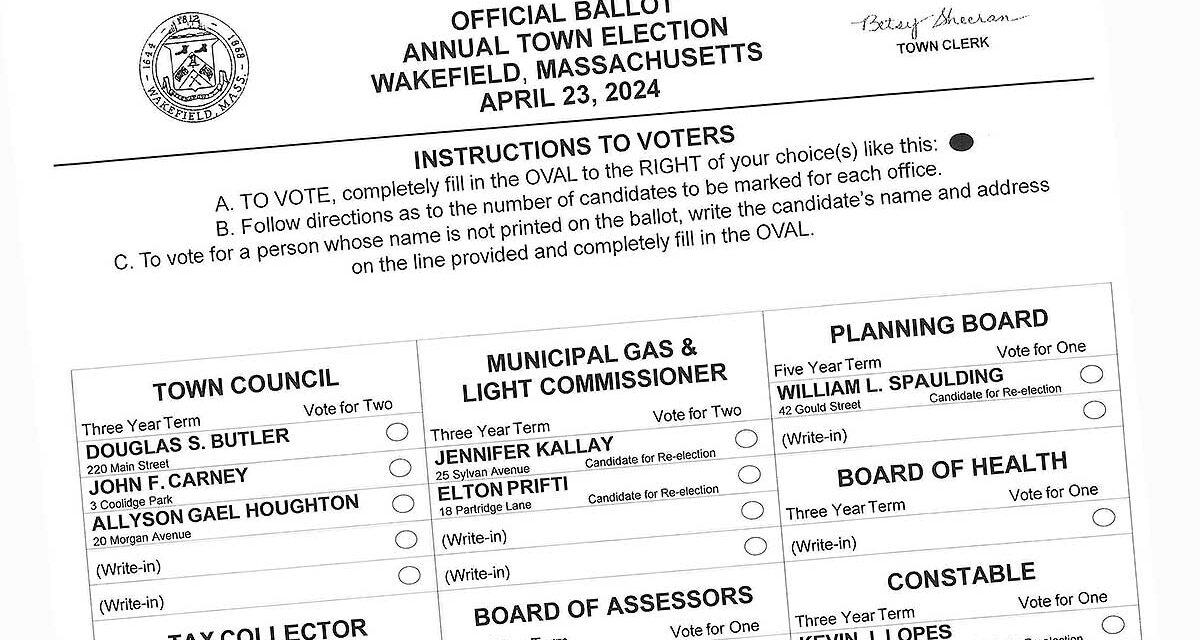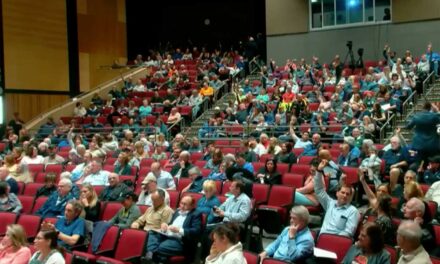WAKEFIELD — Douglas S. Butler, John F. Carney and Allyson Gael Houghton are running for two seats available on the Town Council in the April 23 Town Election. The Daily Item asked the candidates to answer three questions to help our readers as they decide how they are going to vote.
Answers to the second and third questions appear today.
Why do you think Wakefield has managed to avoid a Proposition 2 1/2 override even as may other cities and towns have sought overrides?
JOHN CARNEY: When I last served on the Board of Selectmen in 2010, we were selling off town property to make ends meet and the then Board of Selectmen along with the Finance Committee began projecting town expenditures a decade in advance. I spearheaded the effort to select Steve Maio as our Town Administrator and that is one thing that all the current and past Town Councilors since then agree on. I changed how the Capital Planning Committee operated and allowed the Town Administrator, Superintendent of Schools, and Library Director to have more input.
Simply put, Wakefield has used debt exclusions instead of overrides where when the debt has been paid off, like a mortgage, the tax revenue differential is allocated to the next town priority voted on by the taxpayers at Town Meeting but not before then.
I give credit to Steve Maio, the Finance Committee, Town Treasurer and the legion of Councilors that followed me for putting the town’s financial interest foremost in their long-term goals.
ALLYSON HOUGHTON: I think there are a few reasons Wakefield has been able to avoid a Proposition 2 ½ override. Wakefield has stayed with their budget over the past two years, kept the bond rating high, keeping rates lower and overall costs down but we absolutely cannot lose sight of this. With rising costs, we have to continue to stay fiscally responsible.
Second, Wakefield has seen an increase in new growth over the past few years. Increases in real estate and property taxes lead to increased revenue for the town and help us avoid an override.
Third, I think the amount of state aid that Wakefield has received is also keeping us away from an override. We need to take advantage of as many grants and state opportunities as we can get when we can because we do not know what will be available down the road.
Many other towns have made decisions that have led to reductions in their services. We need to be mindful of how we meet responsibilities.
DOUGLAS BUTLER: Our town’s strong financial position has put us in a much better place than many of our neighbors. We have been able to build up our reserves and maintain disciplined approach to spending. This is why we have a AAA bond rating that has saved and will continue to tax payers millions of dollars in interest expenses. We have avoided Prop 2 ½ overrides because of our town’s very prudent spending and because our town has grown. Since 2010, new infrastructure, commercial and residential development has added 20.6 million to our maximum tax levy. As opposed to other town’s that are overriding Prop 2 1/2, we have saved taxpayers almost $4 million since 2010 by raising taxes less than the 2.5% allowed.
Unfortunately, we appear to be headed down a path of spending down our reserves over the next few years largely due to contractual pressures caused by inflation beyond the 2.5% threshold. I’m running because the future of Wakefield needs both economic growth to improve the town’s revenues and continued fiscal discipline to insure that we are not over spending. The various contract proposals with employees this year will put a strain on our finances for the next few years, but are fair to the men and women who protect, serve, and educate our town. This level of spending cannot become the norm otherwise we will have to extremely difficult choices regarding reducing staffing and services or increasing taxes neither of which are desirable. If elected I’ll do my best to insure we don’t have to face those choices.
Do you support the citizens’ petition minimal compliance MBTA Multifamily Zoning plan, or the Planning Boards’s expanded compliance plan?
ALLYSON HOUGHTON: Massachusetts has continued to see large increases in housing prices while also seeing a decrease in housing availability. The Wakefield housing market continues to be one of the most competitive in the state and with the lack of inventory, housing prices will continue to become unaffordable.
We have to comply with the MBTA Multifamily Zoning Plan or we lose state funding and grant money. We already know this. The planning board’s plan sets up Wakefield to tackle the lack of housing problem already being faced. It takes into consideration the demand for housing in Wakefield. We are a desirable community for many reasons. We have many people who want to stay in the community they love and new residents who want to move here. We need to make sure our community can stay affordable for not only those new residents, but also for those who grew up here and those who are retired and on fixed incomes but want to stay in the town they love. While we won’t be able to guarantee any of the new multi-family homes will be designated affordable housing, creating more inventory will create less competition and help improve costs.
I do think our Planning Board and the working group have put thought into also helping to encourage economic growth in our business communities with this plan. Our small businesses will not succeed and grow without the traffic to help sustain them. The map that has been developed by the Planning Board has been done with so if the intention of driving people toward the business communities.
Even if this proposal is passed at the upcoming Town Meeting it does not mean all these new properties are built immediately. This is something that will be done over time or we may never see a large increase. The district sets up the ability to add additional housing in the future but this is not a production mandate.
Town Meetings will ultimately decide which direction we as a community go and that is why it is important for all community members, no matter how they feel about the issue to be present at Town Meeting.
DOUGLAS BUTLER: I am believer in the need for continued growth in the area surrounding the Wakefield train station and our downtown, because we need to be. We need to invigorate the area so that our small business owners can thrive and so that we have a lively and welcoming town center. An upside of the act is that increasing the population density around the train station and down will bring about greater vitality for our downtown and community as a whole. The aspirational goals of the MBTA Communities act, greater affordability, walkability, and concentration around commuter rail stations are good ones. The manner in which it was enacted leaves a pretty sour taste in both mine and many voters’ mouths and the permanence of granting a right means giving up zoning control.
My issue with the Planning Board proposal is that once you give people the right to develop four units on a lot you can’t rescind that right without state approval. I also don’t appreciate the state using economic threats to gain compliance with the act. Put another way, I’m willing to pay the ransom, but I not going to pay 663 units more than the ransom.
If there is no other alternative put forward, I will vote for the citizen petition because it allows the town the flexibility to add the rights offered to broader areas on the other side of Main Street in the future should it be a success. I do have some reservations about the citizen petition because of possible implications of the seeking input language on the effective functioning of the planning board and would be open to amendments at Town Meeting.
JOHN CARNEY: I have spoken in favor of minimal compliance. However, we all should be asking where our State Senator and Representatives are on this issue. The areas included in the minimal MBTA Override District already have cars parked on their sidewalks and lawns and they were the neighborhood of my youth. I believe there will be a discussion at the Town Meeting to defeat both articles which will allow the Town Council and Administrator to produce a better plan for the fall Town Meeting since the progressive town Planning Board has failed us. If this does not happen, I will vote in favor of the citizens’ petition filed by Councilor Dombroski despite the progressive Planning Board’s refusal.





